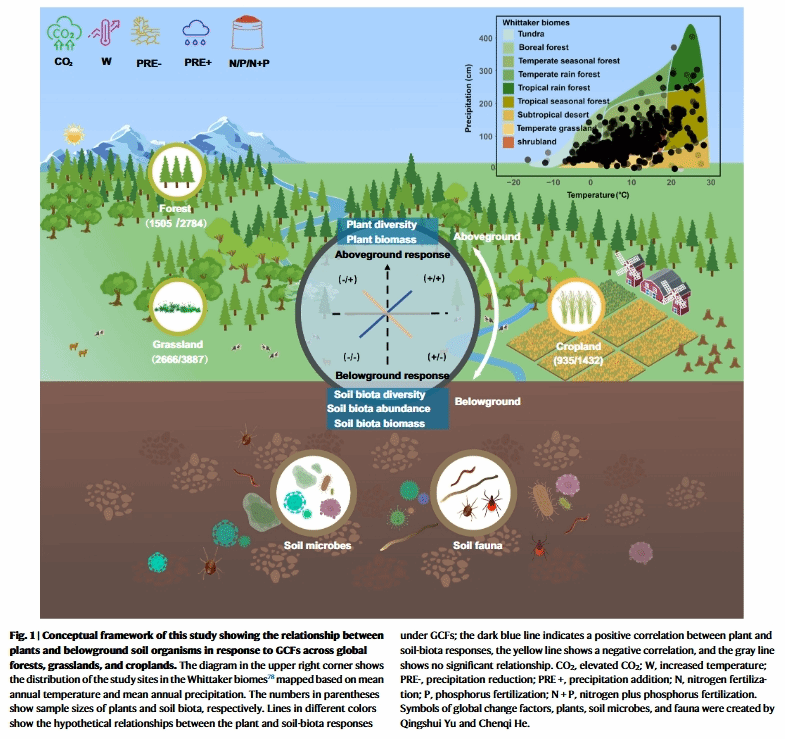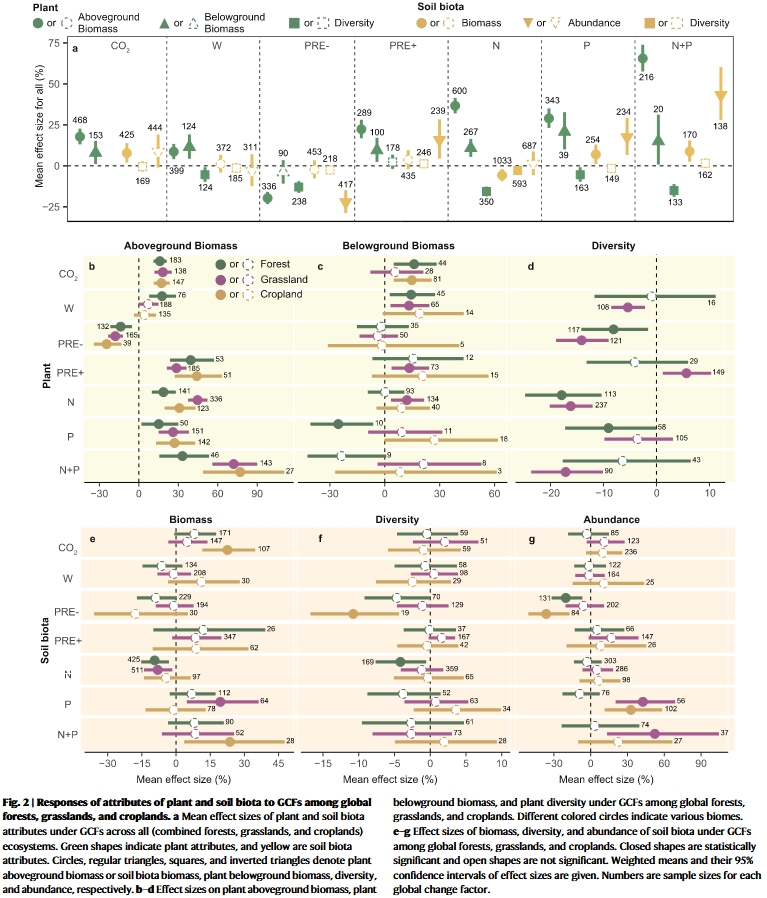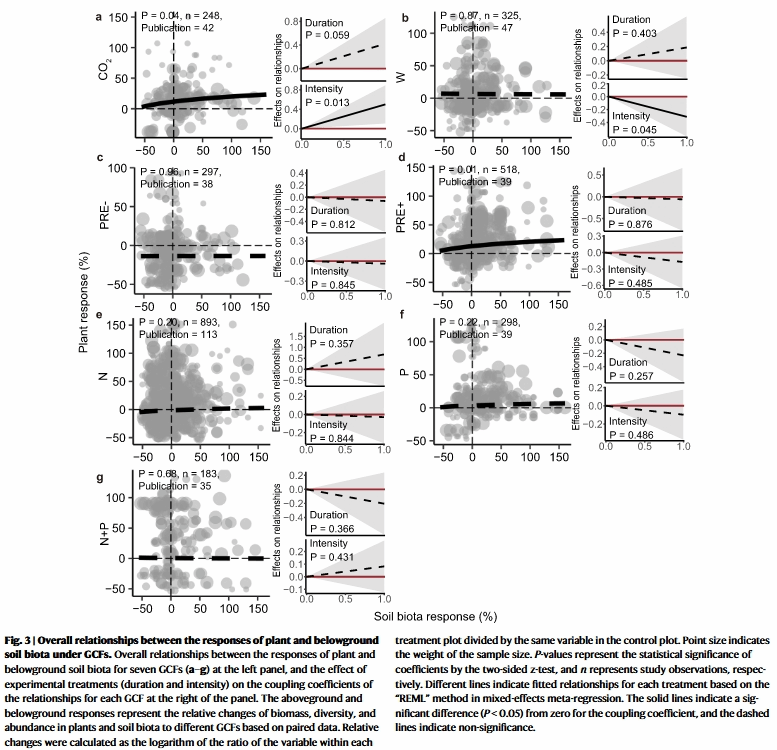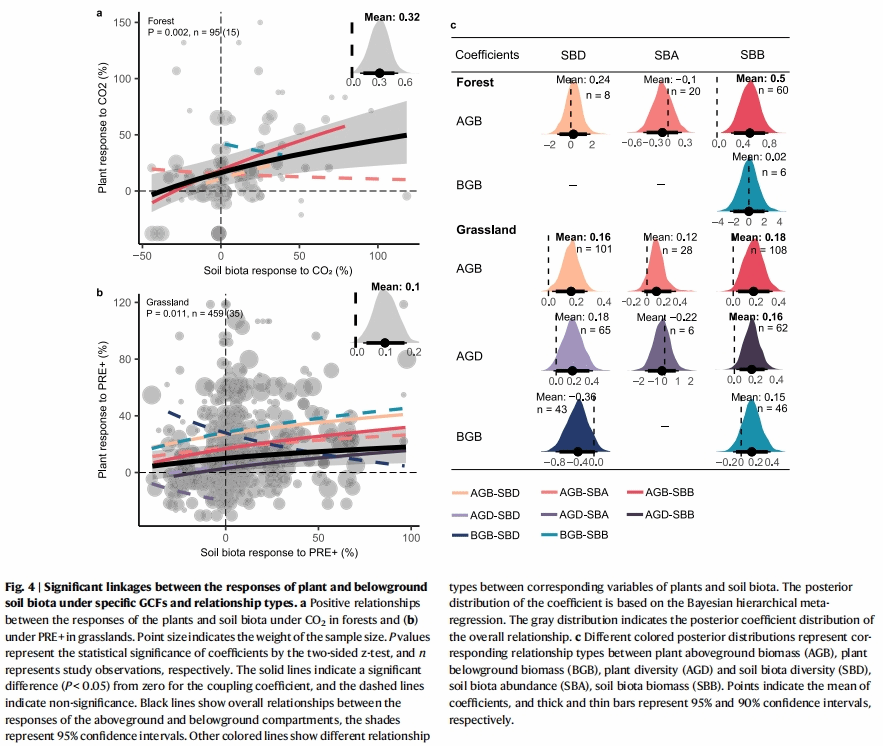文章信息:Yu, Q., He, C., Anthony, M.A., Schmid, B., Gessler, A., Yang, C., Zhang, D., Ni, X., Feng, Y., Zhu, J., Zhu, B., Wang, S., Ji, C., Tang, Z., Wu, J., Smith, P., Liu, L., Li, M.-H., Schaub, M. & Fang, J. (2024). Decoupled responses of plants and soil biota to global change across the world’s land ecosystems. Nature Communications, 15:10369. https://doi.org/10.1038/s41467-024-54304-z
整理人:闫甲祺,2024级硕士研究生
整理时间:2024年12月21日
Abstract: Understanding the concurrent responses of aboveground and belowground biota compartments to global changes is crucial for the maintenance of ecosystem functions and biodiversity conservation. We conduct a comprehensive analysis synthesizing data from 13,209 single observations and 3223 pairwise observations from 1166 publications across the world terrestrial ecosystems to examine the responses of plants and soil organisms and their synchronization. We find that global change factors (GCFs) generally promote plant biomass but decreased plant species diversity. In comparison, the responses of belowground soil biota to GCFs are more variable and harder to predict. The analysis of the paired aboveground and belowground observations demonstrate that responses of plants and soil organisms to GCFs are decoupled among diverse groups of soil organisms for different biomes. Our study highlights the importance of integrative research on the abovegroundbelowground system for improving predictions regarding the consequences of global environmental change.
摘要:了解地上和地下生物区系对全球变化的同时响应对于维持生态系统功能和生物多样性保护至关重要。我们对来自全球陆地生态系统 1166 份出版物的 13,209 个单一观测数据和 3223 个成对观测数据进行综合分析,以检查植物和土壤生物的反应及其同步性。我们发现全球变化因素(GCF)通常会促进植物生物量,但会降低植物物种多样性。相比之下,地下土壤生物群对GCF的反应变化更大,更难以预测。对地上和地下配对观测的分析表明,植物和土壤生物对 GCF 的反应在不同生物群落的不同土壤生物群体之间是解耦的。我们的研究强调了地上地下系统综合研究对于改善对全球环境变化后果的预测的重要性。
1. 研究背景:
全球变化对生态系统的影响: 人类活动导致的环境变化,如气候变暖、CO2浓度升高、氮沉降增加和降水模式改变,对陆地生态系统产生深远影响。
地上与地下生物群落的相互依赖: 地上植物为地下分解者生物和根际生物提供有机碳,而分解者则影响养分的可用性、植物生长和群落组成。
2. 研究意义:
生态系统功能和生物多样性保护: 理解地上和地下生物群落对全球变化的协同响应对于维持生态系统功能和保护生物多样性至关重要。
全球变化因素(GCFs)的影响: 研究全球变化因素对植物和土壤生物群落的影响,以及它们之间的相互作用,对于预测全球环境变化的后果至关重要。
3. 研究方法:
数据综合分析: 通过综合分析来自全球陆地生态系统的13,209个单次观测和3223个成对观测的数据,研究植物和土壤生物群落对全球变化因素的响应。
土壤生物群落分类: 土壤生物群落包括土壤微生物(细菌和真菌)、原生动物、线虫、弹尾虫和其他节肢动物。
全球变化因素(GCFs): 研究包括升高的CO2(CO2)、变暖(W)、降水减少(PRE-)、降水增加(PRE+)、氮肥(N)、磷肥(P)以及氮磷肥(N+P)的影响。
4. 主要结论:
植物生物量与多样性的响应: 全球变化因素通常促进植物生物量的增加,但降低了植物物种多样性。
土壤生物群落的响应: 与地上植物相比,地下土壤生物群落对全球变化因素的响应更为多变且难以预测。
地上与地下响应的脱钩: 在不同土壤生物群落和不同生物群落中,植物和土壤生物群落对全球变化因素的响应是脱钩的。
5. 研究展望:
地上-地下系统综合研究的重要性: 强调了对地上-地下系统进行综合研究的重要性,以改进对全球环境变化后果的预测。
未来研究的重点: 未来的气候变化研究应重点关注温度升高、干旱和施肥的影响,以增强我们对这些因素如何影响生态系统动态和地上与地下组分之间相互作用的理解。
6. 研究主要图表:

01 本研究的概念框架显示了全球森林、草原和农田中植物和地下土壤生物之间对 GCF 的响应

02 全球森林、草原和农田植物和土壤生物群属性对GCF的响应

03 GCF 下植物与地下土壤生物群响应的总体关系

04 不同生物多样性下世界自然遗产的温度差异
原文链接:https://www.nature.com/articles/s41467-024-54304-z
原文转引:https://mp.weixin.qq.com/s/BDJnl1V6vETrA0kCIZ4RFA